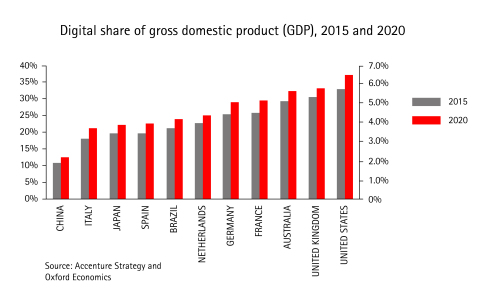 The digital economy accounts for more than 20% of the combined GDP of 11 industrialized nations, according to Accenture Strategy’s ¨Digital Disruption: the Growth Multiplier¨ report. Maximizing use of digital skills and technologies could add another $2 trillion worth of economic activity to the global economy, the authors said.
The digital economy accounts for more than 20% of the combined GDP of 11 industrialized nations, according to Accenture Strategy’s ¨Digital Disruption: the Growth Multiplier¨ report. Maximizing use of digital skills and technologies could add another $2 trillion worth of economic activity to the global economy, the authors said.
Accenture’s report provides new and comprehensive metrics that reveal the scale of the digital economy in 11 major countries by estimating the value added to GDP by hardware, software and related ICT, as well as by workers who use digital assets in their daily work. It also calculates the value of intermediate digital goods and services used in making final products and services.
Digital Capital and Economic Growth
Twenty-two percent of world economic output is linked to digital skills and capital, according to Accenture. The U.S. digital economy is the most developed, accounting for 33% of national GDP. Furthermore, 43% of the U.S. workforce and 26% of national capital are capable of supporting economic activities related to digital technologies.
Elsewhere, digital economies range in value from more than 30% in the U.K. and Australia to 10% in China.

“Businesses and governments are turning to digital to secure faster growth amid an uncertain global economic outlook, but the size of the digital economy is no guarantee of growth,” Accenture Strategy group chief executive Mark Knickrehm stated.
“Organizations need to act aggressively in shifting the focus of their digital talent and technology from making efficiencies to creating entirely new business models. That requires not just greater digital investments, but broader organizational and cultural transformation in order to yield the greatest returns.”
Digital Economy Metrics and Platform Business Strategies
Accenture’s Digital Density score tracks the extent to which digital skills and capital penetrate a country’s businesses and economy. Companies and countries looking to generate faster growth will need to raise their scores, Accenture says. That includes investing in digital skills and technology, as well as enabling factors such as access to finance and an open regulatory environment.
A 10% increase in the overall Digital Density of the U.S. economy would wind up adding $368 billion to 2020 GDP, Accenture calculates. An optimal combination of improvements to digital skills, capital and other factors could raise U.S. GDP by $421 billion by 2020, a 2.1% boost.
Adopting collaborative ¨platform¨ business models that enable organizations to uncover value and create new markets stand out for their potential to generated digital economic growth, Accenture continues. In many cases, making use of platform business models can generate high rates of growth without the need to own assets, which helps businesses expand while keeping marginal costs low.
Startups and younger companies dominate when it comes to employing digital platform business models, researchers said. Longer established ¨traditional¨ industry players could benefit most from adopting platform business strategies by combining their customer reach and product portfolios with network platforms, the researchers added.
“The high growth rates experienced by many digital companies can now be enjoyed by traditional industry incumbents if they apply platform models to create an ecosystem of partners and customers in which they can offer new value added services,” elaborated Bruno Berthon, Accenture Strategy managing director. “Companies need to shape their platform strategies and define their role as platform leaders or participants before aggressively forming partnerships that can deliver new value.”
Accenture recommends companies take three broad actions to optimize their digital economic potential:
- Prioritize digital investments based on value opportunities: Assess carefully the balance of digital investments so that an optimal combination of improvements to skills and technology can maximize returns on digital investments
- Compete using an industry-specific digital strategy: Be clear on which platform, what roles, and which data are fundamental to compete successfully in your industry.
- Create the right environment for digital transformation: Improve your “digital IQ,” teaming with government to open up cross-industry relationships and change the rules of competition.


